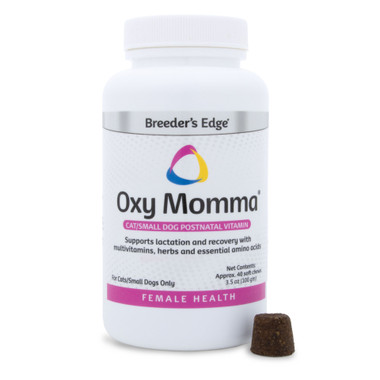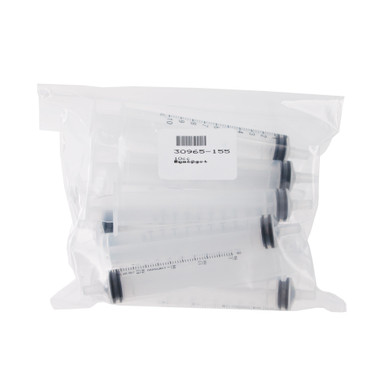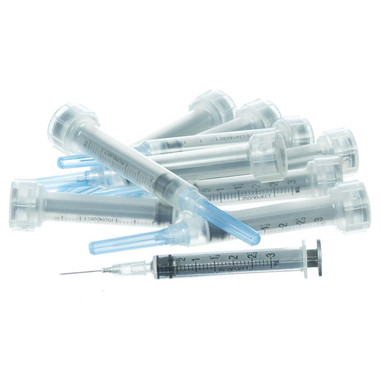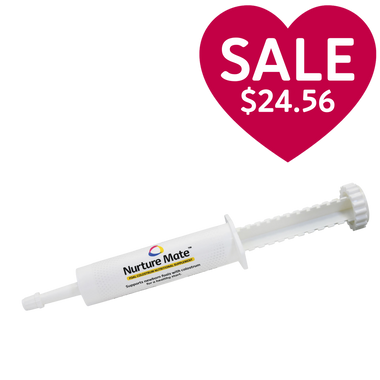Lyme Disease, The Invisible Demon for Your Horse!
Estimated 0 min read
Both horses and humans can develop Lyme Disease, and it’s way more prevalent than you think. Know how to reduce your horse’s risks and what symptoms to look out for.
What is Lyme disease?
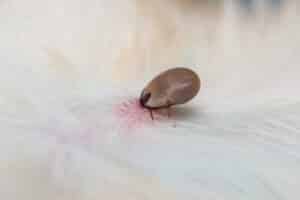
Tick on horse’s skin
Lyme Disease is an illness transmitted by ticks, which are a parasite, and can be found throughout the United States. Yet now, they are prevalent in areas of the country where they were, hitherto, not present. Some say this is due to climate change while others point out that the increase in deer populations has contributed. However, ticks do not limit themselves to deer, they feed off other forms of wildlife. Whatever the cause, ticks are now a major concern.
Both horses and humans can become victims. But, we have help for you! Here’s some information to help you reduce your horse’s risk of contracting Lyme Disease. Along with this, we’ll describe symptoms of Lyme Disease and what to do if you think your horse has fallen prey.
Effects and Clinical Signs/Symptoms of Lyme Disease in Horses
Cornell University’s Animal Health Diagnostic Center Lyme disease publishes afact sheet on Lyme Disease.Likewise, it describes the clinical signs of Lyme disease in horses that can look like shifting-leg lameness and generalized stiffness. Other symptoms include hypersensitivity to touch, weight loss and poor performance. Even more important, if the bacterium infects the central nervous system it can result in neurological symptoms. But here’s the rub, only 5-10 percent of infected horses show clinical signs.
According to an excerpt from the Cornell fact sheet “These signs typically occur at the chronic disease stage but can be evident as early as 2-5 months after infection. Although, it is possible for signs to develop much later”
Diagnosis
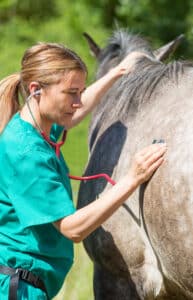
Veterinary great performing a scan to a young mare
Lyme disease.org says Lyme disease is called ‘The Great Imitator” because its symptoms mimic many other diseases. Furthermore, it can affect any organ of the body, including the brain, nervous system, muscles, joints and heart.
If you think your horse may have Lyme Disease, your veterinarian will conduct an examination to confirm clinical signs of the disease. In addition, they will order bloodwork. Cornell’s Animal Health Diagnostic Center says a serologic test such as the Lyme Multiplex Assay helps to diagnose the disease by measuring antibodies. But here’s where we say…Hold your Horses! According to Dr. Thomas Divers of Cornell University says..”antibodies need to be paired with clinical signs that are compatible with Lyme disease in horses…. Such as hyperesthesia (heightened skin sensitivity) or pseudolymphoma (enlarged lymph nodes that look malevolent). Further he says…”make sure that other diseases with those same clinical signs are ruled out before jumping on the Lyme disease bandwagon.
Treatment of Lyme Disease for Your Horse
To date there is no consensus on a preferred drug for treating equine Lyme disease. But, in a Lyme Disease pony study (conducted at Cornell University) where IV antibiotic (tetracycline) was administered, complete success was recorded. While other ponies, who received oral or IM antibiotics (doxycycline and ceftiofur respectively) had no disease resolution. In general,
horses diagnosed with Lyme disease may undergo a round of antibiotic treatment such as doxycycline. In addition, anti-inflammatory pain medication may provide some benefit in addressing uncomfortable physical symptoms.
Lyme Disease – Case Study: Ruger – a 12 year old Paint Gelding
Northern New York resident Paula Filiatrault has owned 12-year-old Paint gelding Ruger since he was 2 years old. In August 2019, she sent him to a trainer, and after he came home, she began riding him regularly. But he began misbehaving. Examples of bad behavior were trying to take off as she was mounting. Finally, he started pulling away when she tried to push on his poll to ask him to lower his head.
“He was always really easygoing—nothing really bothered him, but he got to where he didn’t want me to get on him,” Paula says. “He was really sensitive to any sort of pressure; it actually scared him. That made me wonder what was going on.”
Her veterinarian checked his teeth, and suggested blood work to help find a diagnosis. His results came back showing he had Lyme disease. Moreover, he already had high levels of the bacterium in his blood. What’s more, his knees were quite swollen.
Ruger was initially treated, twice a day, with antibiotics for 60 days. He had made improvements, but in just a matter of a couple months, he had a flare up. Paula has now added a joint supplement to Ruger’s diet along with an anti-inflammatory. In addition, he’s being maintained on a low sugar diet—similar to a diet for a horse with Founder. The thought is that this diet will be better to help control the inflammation. She hopes that she will have the opportunity to trail ride him again.
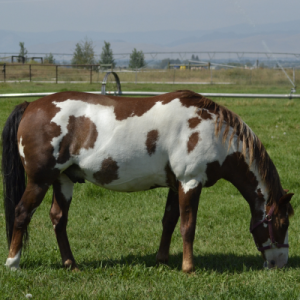
Paint Gelding
Positive Results
“His demeanor has come back—he’s back to being more playful, not so jumpy,” Paula says. “I still haven’t gotten to the point of riding him consistently. He’s the type of horse that doesn’t show pain well until it gets really bad. But I’ve done a lot more groundwork with him to keep his mind going until I can get a better diet and treatment planned out for him. He’s on the road to recovery.”
Paula has found other horse folks seeking treatment methods for their horses in Facebook groups, and in her area, and has been surprised how many horses have the disease.
“I didn’t realize it was such a prevalent disease,” Paula says. “It seems like it’s masked by a lot of other things. I think a lot of horses may have it and people don’t even know it. So, if your horse is acting up at all, don’t be afraid to test for it.”
Lyme Disease Prevention… What you can do to Help Your Horse
While there are Lyme disease vaccines for dogs, there are none developed specifically for horses. Some horses have had good luck with the canine vaccine, although it’s not foolproof and it’s considered “off label.” If you live in an area with high numbers of Lyme disease cases you may want to discuss an annual assay test with your veterinarian. This can provide you with either a heads-up or peace of mind that your horse is not affected!.
Your best chance for prevention of Lyme disease in your own horse is thorough daily examination for ticks. Luckily, infected ticks need to “feed” off your horse for some time before seriously affecting your horse. If you discover a tick on your horse’s body, remove it immediately…the cycle has already begun since you won’t know how long it’s been there.
Do make sure that you knowhow to safely removeit. Then, dispose of it safely. Since it takes two years for the tick to mature from an egg to an adult, one can never let one’s guard down. After a ride or when you bring your horse in at night, run your hands over the body. Ticks are often felt with your hands before they are visible. Likely places to find them are the chest, between your horse’s front legs and along midline “seam” of the tummy. Additionally, they may lurk in your horse’s forelock, mane or tail.
by Abigail Boatwright
Banixx Horse Blogs
Horse Care never takes a holiday. That’s why we have put together many common-sensehorse blogs that spell out horse care in a straightforward way. For example, ever wondered about a horse’swolf teeth? or are you interested in the miracles ofacupuncture for your horse?Or even … ways tohandle manure removal…then again, have you heard of the world’s smallest horse? ,Einstein! He’s smaller than most dogs. Don’t worry, we’ve got these covered for you!
Moreover, if your horse ever gets anywounds,cuts.scratchesorwhite line disease, we hope you keepBanixx Horse Carein mind. Need your own Banixx, clickhereto find out where to buy it!
Sources
vet.cornell.edu/animal-health-diagnostic-center/laboratories/serology-immunology/lyme-disease–Cornell University College of Veterinary Medicine’s Animal Health Diagnostic Center not only provides testing for animal illnesses such as Lyme Disease. It also put together thisFrequently Asked Questionspage about Lyme Disease in horses.
https://aaep.org/horsehealth/tick-control-horses










